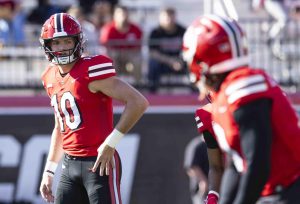Linds Lets Loose: Let’s stick to constructive criticism on Halloween
October 30, 2013
So many of us are familiar with “Mean Girls” and its famous Halloween quote, “In the regular world, Halloween is when children dress up in costumes and beg for candy. In Girl World: Halloween is the one night a year when a girl can dress like a total slut and no other girls can say anything about it.”
Which begs the question: is it okay to say anything negative about a girl’s Halloween costume—or anyone’s Halloween costume—behind her back or to her face? And, if we are going by the logic of the quote, is it okay to say anything about someone’s cosplay (costume play) outfit that they wear any other night of the year?
The simple answer: Yes.
The complex answer: Yes, if there is something problematic about her costume. And I’m not talking about problematic in the sense that “her legs are too wide for her to be Sailor Moon.”
I mean problematic in terms of trivializing an entire group of people into a single costume idea, or making a costume racist. Below are two examples.
Example number one: The other day, I went on a long and arduous journey to find a sailor hat for my Halloween costume as a male Future Sailor from the show “The Mighty Boosh,” proving that a gender-bending costume is obviously okay. However, instead of finding a sailor hat, I found myself standing in front of a costume with a white, blonde-haired girl in Native American attire, a typical teepee and Western background behind her.
But none of this problematic information is the worst part about the costume packaging. The worst part is that the name of the costume is “Pocahottie.”
I immediately groaned out loud.
It’s problematic when companies trivialize an entire culture for the sake of selling a Halloween costume. It’s problematic when a historical woman of color is sexualized and therefore trivialized.
Never mind that she has historical significance — let’s make a funny pun of her name!
And lastly, I found the costume in poor taste because Pocahontas did not live out west, nor did she live in a teepee.
Instead, she and the Powhatan tribe lived in Virginia in wigwams. Every aspect of the costume was offensive, and in this case, if you see one of your friends wearing such a costume and choose to point out why it is problematic in a polite and intelligent way, more power to you.
Example number two: Recently, Julianne Hough came under scrutiny by the public for doing what is known as “Black Face” for her Halloween costume. Hough was portraying “Crazy Eyes,” a black character from the hit Netflix series “Orange is the New Black.”
Is it wrong of Hough to dress as Crazy Eyes in the first place? Absolutely not. In fact, I’m mad at myself for not considering that in the first place. However, Hough was wrong in her decision to paint her face black to get in touch with the character.
According to a recent column in the Los Angeles Times, black face is considered offensive because it was originally done during a time when black people were viewed by those in power — white males — as less than human, and was done by white people, for white people, as a tool of degradation.
Black face has the power to turn black people into caricatures by a group of people with the privilege and is another type of Halloween costume that should not be acceptable.
Calling out racism should not extend to slut-shaming this Halloween, whether to someone’s face or behind his or her back. I’m not thin by any means, but if I decided to wear a short skirt and tight shirt, I better not hear any nasty words coming from you.
Are you allowed to your opinions? Of course.
But unless my hypothetical Halloween costume involves black face or Pocahottie, please, keep non-constructive criticism to yourself and enjoy your candy.












